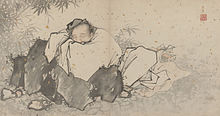
The Jin dynasty or the Jin Empire, sometimes distinguished as the Sima Jin (司馬晉) or the Two Jins (兩晉), was an imperial dynasty in China that existed from 266 to 420. It was founded by Sima Yan, eldest son of Sima Zhao, who had previously been declared the King of Jin. There are two main divisions in the history of the dynasty. The Western Jin (266–316) was established as the successor to Cao Wei after Sima Yan usurped the throne from Cao Huan and took the title of Emperor Wu. The capital of the Western Jin was initially in Luoyang, though it later moved to Chang'an. In 280, after conquering Eastern Wu, the Western Jin ended the Three Kingdoms period and reunited China proper for the first time since the end of the Han dynasty.

The Eight Immortals are a group of legendary xian ("immortals") in Chinese mythology. Each immortal's power can be transferred to a vessel (法器) that can bestow life or destroy evil. Together, these eight vessels are called the "Covert Eight Immortals" (暗八仙). Most of them are said to have been born in the Tang or Song Dynasty. They are revered by the Taoists and are also a popular element in secular Chinese culture. They are said to live on a group of five islands in the Bohai Sea, which includes Mount Penglai.

He Xiangu, birth name He Qiong, is a Chinese mythological figure and one of the Eight Immortals in the Taoist pantheon. She is often seen as the only female among the Eight Immortals. He Xiangu is believed to have lived in the Tang dynasty and was born in either Lingling District, Yongzhou, Hunan or Zengcheng District, Guangzhou, Guangdong, and some portrayals have her as the daughter of a shopkeeper.

Han Xiangzi, courtesy name Qingfu or Beizhu, is a Chinese mythological figure and one of the Eight Immortals in the Taoist pantheon. He studied Taoist magical arts under the tutelage of Lü Dongbin, another of the Eight Immortals. Han Xiangzi is often depicted carrying a dizi, so he is also regarded as the patron deity of flutists. He is also believed to be the composer of the Taoist musical piece Tian Hua Yin (天花引).
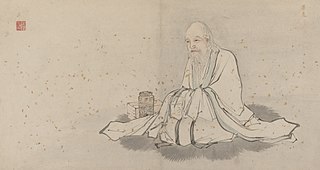
Zhang Guo, better known as Zhang Guolao, is a Chinese mythological figure and one of the Eight Immortals in the Taoist pantheon. Among the Eight Immortals, Zhang Guolao, Zhongli Quan and Lü Yan were real historical figures. His existence is said to have begun around the middle or end of the 7th century, and ended approximately in the middle of the 8th. The epithet "Lao" added at the end of his name means "old".

Zhongli Quan, courtesy name Jidao, is a Chinese mythological figure and one of the Eight Immortals in the Taoist pantheon. He is also known as Han Zhongli because he was said to have been born in the Han dynasty. In legend, he holds a peach and wields a large feather fan which can resurrect the dead and transform stones into silver or gold.

Zhang Jue was a Chinese military general and rebel. He was the leader of the Yellow Turban Rebellion during the late Eastern Han dynasty of China. He was said to be a follower of Taoism and a sorcerer. His name is sometimes read as Zhang Jiao, since the Chinese character of Zhang's given name can be read as either "Jiao" or "Jue". "Jue" is the traditional or literary reading, while "Jiao" is the modern or colloquial one.
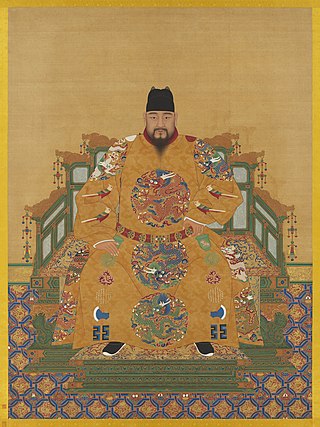
Emperor Yingzong of Ming, personal name Zhu Qizhen, was the sixth and eighth emperor of the Ming dynasty. He ruled as the Zhengtong Emperor from 1435 to 1449, and as the Tianshun Emperor from 1457 until his death in 1464.

The Jingtai Emperor, also known by his temple name as the Emperor Daizong of Ming (明代宗) and by his posthumous name as the Emperor Jing of Ming (明景帝), personal name Zhu Qiyu (朱祁鈺), was the seventh emperor of the Ming dynasty, reigned from 1449 to 1457. He succeeded his elder brother, Emperor Yingzong, who had been captured by the Mongols. "Jingtai", the era name of his reign, means "exalted view". He was overthrown in a palace coup led by Yingzong in February 1457, and died a month later.
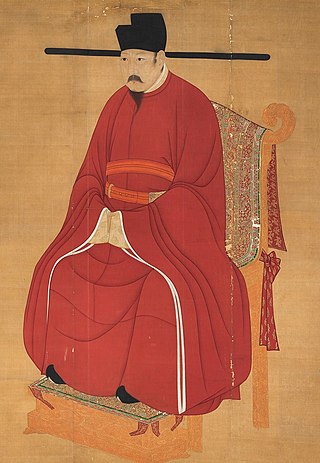
Emperor Renzong of Song, personal name Zhao Zhen, was the fourth emperor of the Northern Song dynasty of China. He reigned for about 41 years from 1022 to his death in 1063, making him the longest reigning Song dynasty emperor. He was the sixth son of his predecessor, Emperor Zhenzong, and was succeeded by his cousin's son, Zhao Shu who took the throne as Emperor Yingzong because his own sons died prematurely.
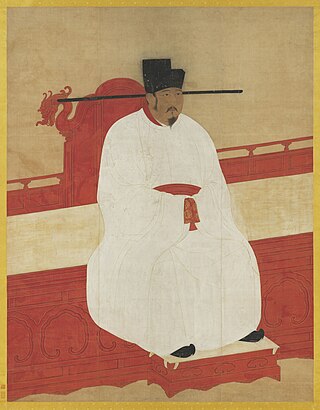
Emperor Yingzong of Song, personal name Zhao Shu, was the fifth emperor of the Song dynasty of China. His original personal name was Zhao Zongshi but it was changed to "Zhao Shu" in 1062 by imperial decree. He reigned from 1063 to his death in 1067. He was succeeded by his eldest son, Emperor Shenzong.
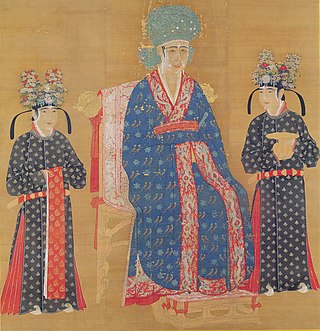
Empress Cao was a Chinese empress consort of the Song dynasty, married to Emperor Renzong of Song. She served as regent of China during the illness of Emperor Yingzong, from 1063 until 1064.
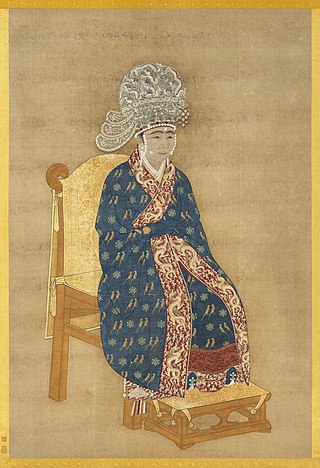
Empress Gao (1032–1093) was a Chinese empress of the Song dynasty, married to Emperor Yingzong. She served as the regent of China during the minority of her grandson, Emperor Zhezong, from 1085 until her death in 1093.
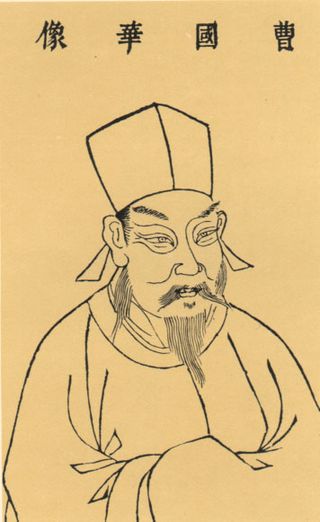
Cao Bin was a military general in imperial China. A nephew-in-law of Guo Wei, who founded the Later Zhou in 951, Cao first rose up through the ranks of the Later Zhou military. After the Song Dynasty replaced Later Zhou in 960, Cao participated in the conquest of the Later Shu state in 965, where he distinguished himself from the other generals for disciplining his troops from pillaging the area, and was promoted as a result. In 974, he was named the overall commander to invade the Southern Tang state, which he successfully conquered in 976, again taking careful measures to prevent unnecessary killing. However, in one last campaign in 986 against the northern Liao Dynasty, he suffered a crushing defeat at the hands of Yelü Xiuge.

The Crow Terrace Poetry Trial was a trial on charges including treason and lèse majesté that occurred in the year 1079 of Song dynasty era in Chinese history. The legal action conducted against Su Shi by government prosecutors has abiding interest in the case of government censorship versus artistic freedom. "Crow Terrace" designates the nickname for the Imperial Office of the Censorate (御史臺), the office which prosecuted the case, citing Song Criminal Code, Article 122: "Denouncing the Imperial Chariot". The Imperial Censorate accused dozens of defendants. The most prominent of the dozens accused was the official, artist, and poet Su Shi, whose works of poetry were produced in court as evidence against him.
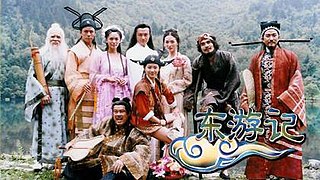
Legend of the Eight Immortals is a Singaporean television series based on stories about the Eight Immortals in Chinese mythology and adapted from the 16th-century Chinese novel Dong You Ji by Wu Yuantai (吴元泰). Produced by the Television Corporation of Singapore in collaboration with two mainland Chinese companies, the series had cast members from Singapore, Taiwan, Hong Kong and mainland China. It was first aired in Singapore on TCS Channel 8 from 26 November 1998 to 6 January 1999.
Noble Consort Zhang, personal name unknown, posthumously Empress Wencheng (溫成皇后), was a concubine of Emperor Renzong of Song. She was the emperor's favorite, but did not become an empress due to the strong opposition of Empress Dowager Liu. Noble Consort Zhang, a native of Yong'an, Henan, was an important figure in the Kunning Palace Incident and the birth mother of Princess Anshou, Princess Baohe, and Princess Tangguo.
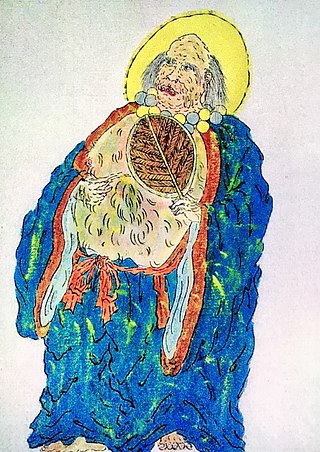
Barefoot Immortal, also known as Barefoot Master, is a Taoist deity in Chinese religion. He is known for his numerous appearances in Chinese operas and Chinese ancient literature Journey to the West and Outlaws of the Marsh. The ancient images and ceramic works that people found about the conception of the appearance of Barefoot Immortal demonstrate that in the minds of most people, Barefoot Immortal is a kind god who always has a gracious smile on his face. Never wearing any shoes and half bald head are his unique marks and looks. There are several stories and legends about Barefoot Immortal that have become the widely known classical folk oral literature in China. His original name is Liu Hai before he was widely known as Barefoot Immortal. and Liu Cao
Wang Weiyi, also known as Wang Weide (王惟德), was a Chinese physician and writer of the Song dynasty. He was as an expert on acupuncture famous for creating bronze figure models and compiling a book on the subject. He was the imperial physician of two emperors: Renzong and Yingzong.
